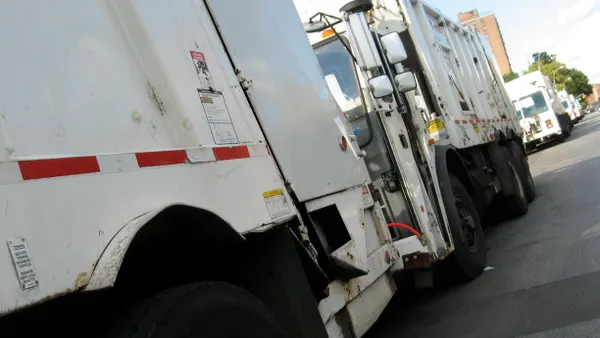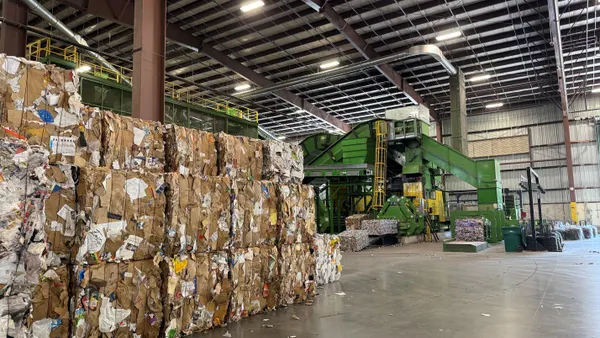Correction: A previous version of this article implied that presenters were specifically seeking a recyclability determination at the MRF Council meeting.
Dive Brief:
- The Institute of Scrap Recycling Industries (ISRI) hosted a meeting of its MRF Council in Washington, D.C. last week, where members heard presentations about recycling efforts for new consumer product streams. More than 60 people participated in the discussion, representing a broad spectrum of private, public and trade association interests.
- The group heard from three organizations seeking to expand recycling recognition for their products. This included Keurig Green Mountain's K-Cup coffee pods, Hefty's EnergyBag flexible packaging program, and the Foodservice Packaging Institute's (FPI) work on take-out containers and paper or plastic cups. The MRF Council did not make any decisions on the recyclability of these items or whether they would be included in the ISRI Specifications Circular.
- ISRI President Robin Wiener said in a statement that any successful curbside recovery program requires a high-quality stream so products made from recycling can meet specifications demanded by end users. "Introducing new products without proper vetting could only further increase levels of contamination which is why ISRI is grateful for the work and involvement of all those in attendance," said Wiener.
Dive Insight:
The MRF Council's meeting offered a chance to learn more about some of the ongoing questions around each material stream. Prior to the meeting, six non-profit MRF operators wrote a joint letter expressing concerns about potential contamination and education challenges with the various projects.
After the presentations were made, all of these presenters left the room for about an hour to allow for more open discussion. During that time, China's new contamination standards were reportedly a looming factor and many in attendance expressed skepticism about whether it made sense to consider any of these materials universally acceptable in MRFs across the country.
Keurig has been working diligently to make K-Cups fully recyclable by 2020 through industry consultation and numerous MRF tests. This has proven successful enough that the company will be shifting to new packaging in Canada next year. Yet the company still can't guarantee that a high enough percentage of its material will make it through a MRF to the proper container line. The potential contamination from coffee grounds is also still a concern.
The Hefty EnergyBag, a project from the Dow Chemical Company, has been implemented in Omaha, NE to co-collect flexible plastics with other curbside recyclables. Dow has described this as a complement to existing recycling efforts for flexible packaging that doesn't otherwise have a clear market. Environmental advocacy groups such as the Global Alliance for Incinerator Alternatives (GAIA) have since launched a campaign, with support from many high profile municipal and advocacy groups, against the program's method of converting the plastics into refuse-derived fuel. Keep America Beautiful, initially cited as a partner on new grant funding to expand the program, has since narrowed the definition of its involvement.
FPI's proposal to expand recycling of take-out containers, cups, and other related packaging has received comparatively more acceptance. The group recently announced that these items would be added to recycling programs in Washington, D.C., Louisville, KY and Chattanooga, TN. That came after multiple years of consultation with regional MRFs about end markets and contamination specifications. FPI also provided grant funding to help each city with consumer education. This proposal raised its own questions at the ISRI meeting about whether such items could be universally accepted at all U.S. facilities, how food contamination would be mitigated and whether compostable packaging was a better option.
Packaging adaptation is a natural part of recycling's evolution, and consultation with the industry is always seen as a productive approach. Though until more clarity can be gained on China's import policies, it many MRF operators are too focused on improving the quality of their existing streams to consider taking on anything new.












